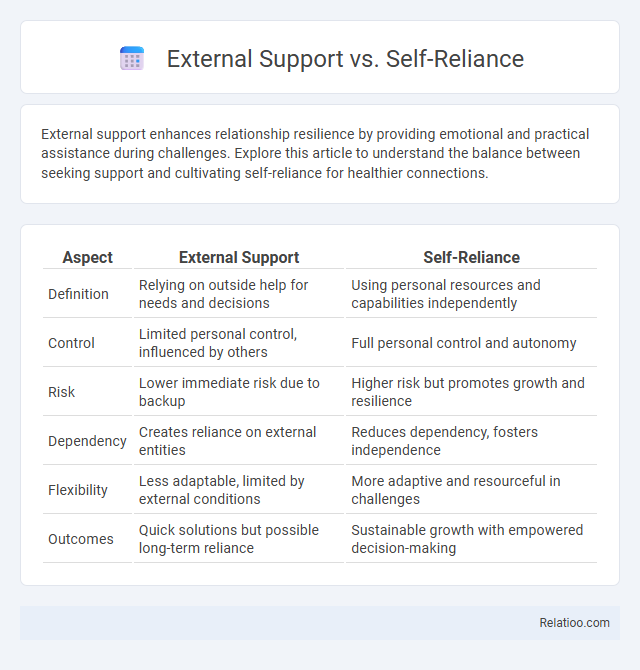External support enhances relationship resilience by providing emotional and practical assistance during challenges. Explore this article to understand the balance between seeking support and cultivating self-reliance for healthier connections.
Table of Comparison
| Aspect | External Support | Self-Reliance |
|---|---|---|
| Definition | Relying on outside help for needs and decisions | Using personal resources and capabilities independently |
| Control | Limited personal control, influenced by others | Full personal control and autonomy |
| Risk | Lower immediate risk due to backup | Higher risk but promotes growth and resilience |
| Dependency | Creates reliance on external entities | Reduces dependency, fosters independence |
| Flexibility | Less adaptable, limited by external conditions | More adaptive and resourceful in challenges |
| Outcomes | Quick solutions but possible long-term reliance | Sustainable growth with empowered decision-making |
Understanding External Support
Understanding external support involves recognizing the importance of resources and assistance available from outside sources, such as family, community, and professional services. Your well-being often improves when you effectively balance self-reliance with seeking external support, ensuring you do not isolate yourself or become overly dependent. Nurturance from others provides emotional and practical reinforcement, creating a foundation for resilience and growth.
Defining Self-Reliance
Self-reliance is the ability to depend on your own resources, judgment, and capabilities without excessive reliance on external support or nurturance. It emphasizes personal responsibility, problem-solving, and resilience in overcoming challenges through individual effort. Developing self-reliance fosters independence and confidence, balancing external assistance with internal strength.
Benefits of Seeking External Support
Seeking external support provides access to diverse perspectives and resources that enhance problem-solving and emotional resilience. It fosters social connections and collaborative networks, leading to improved mental health and increased opportunities for personal and professional growth. Leveraging community or expert assistance can accelerate recovery from challenges and promote sustained well-being.
Advantages of Embracing Self-Reliance
Embracing self-reliance cultivates resilience and empowers you to solve problems independently, fostering a strong sense of personal competence. Unlike relying solely on external support, self-reliance builds long-term confidence and adaptability in facing challenges. This approach encourages proactive growth and nurturance of your inner strengths for sustained success.
Situations Favoring External Support
Situations favoring external support often arise during complex challenges requiring specialized expertise or resources beyond an individual's capacity, such as medical emergencies or large-scale projects. External support enhances problem-solving efficiency, providing access to professional guidance, emotional comfort, or financial aid that self-reliance or nurturance alone may not suffice. Leveraging community networks, institutional services, and collaborative efforts maximizes outcomes in scenarios where individual efforts are limited or compromised.
Scenarios Where Self-Reliance Excels
Self-reliance excels in scenarios requiring quick decision-making and adaptability, such as emergency situations or entrepreneurial ventures, where external support may be unavailable or slow. It fosters independence, confidence, and problem-solving skills, enabling individuals to navigate challenges without relying heavily on others. Practicing self-reliance builds resilience, making it a crucial approach in unpredictable or resource-limited environments.
Striking the Right Balance
Striking the right balance between external support, self-reliance, and nurturance is essential for sustainable personal growth and emotional well-being. Over-dependence on external support can undermine self-confidence, while excessive self-reliance may lead to isolation and burnout. Nurturing relationships provide critical emotional resources that complement independence and help maintain resilience in the face of challenges.
Common Misconceptions
Common misconceptions about external support vs self-reliance vs nurturance often confuse independence with isolation, leading to the belief that seeking help diminishes personal strength. Many assume self-reliance means refusing all assistance, overlooking that true resilience involves balancing support networks with personal effort. Understanding how nurturance fosters growth without dependency can reshape Your approach to achieving sustainable well-being.
Impact on Personal Growth
External support provides a foundation for your confidence by offering resources and guidance that foster new skills and resilience. Self-reliance strengthens personal growth through independent problem-solving and the development of internal motivation, leading to greater self-efficacy. Nurturance enhances emotional well-being and self-awareness, creating a balanced environment where growth can flourish through compassion and encouragement.
Choosing the Best Approach
Choosing the best approach between external support, self-reliance, and nurturance depends on the individual's circumstances, resources, and goals. External support provides valuable assistance and expertise, while self-reliance fosters independence and resilience, and nurturance promotes growth through consistent care and encouragement. An optimal strategy often balances these approaches, leveraging external help when necessary, strengthening personal capabilities, and ensuring emotional and developmental support.

Infographic: External support vs Self-reliance
 relatioo.com
relatioo.com